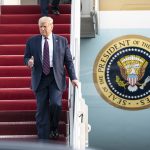In a move that has electrified conservatives, President-elect Donald Trump is reportedly set to appoint Senator Marco Rubio of Florida as his Secretary of State. This news comes amid a flurry of announcements as Trump assembles his cabinet, and is seen as a strategic choice that aligns with the administration’s vision for a robust foreign policy and national security strategy. While Trump may yet have moments of indecision, sources close to the transition team suggest Rubio is the front-runner, following a lengthy consideration process that echoes Rubio’s prior candidacy for running mate.
Rubio boasts a significant political portfolio, having served in the Senate since 2010 and made his mark during the 2016 presidential race. His continued loyalty to Trump, even after not being selected as a running mate, showcases the steadfastness that the Trump administration values. This selection could signal a shift towards a more pragmatic approach in foreign relations, especially as the complexities of global conflicts continue to unfold.
The senator recently voiced concerns about U.S. involvement in the ongoing war in Ukraine, highlighting a critical point that resonates with a growing faction of the conservative base. Rubio noted that the current expenditure of taxpayer dollars is effectively financing a stalemate rather than fostering a clear path toward victory for Ukraine. This recognition of funding limitations and the need for a commonsense strategy reflects a departure from the reckless spending observed under the previous administration, emphasizing prudence in U.S. foreign policy.
REPORT: Donald Trump Will Select Sen. Marco Rubio As Secretary of Statehttps://t.co/7tJ3tlqaDY
— RedState (@RedState) November 12, 2024
The landscape of international relations under a Trump administration with Rubio at the helm is expected to prioritize strategic interests, advocating for clear outcomes rather than prolonged conflicts that lead to endless cycles of engagement. As conservatives rally around this potential appointment, the call for a measured response to crisis situations, while maintaining support for allies, is becoming increasingly significant.
Additionally, Rubio’s likely departure from the Senate opens the door for Florida Governor Ron DeSantis to appoint a successor, ensuring that strong conservative leadership remains intact in the Sunshine State. This dual benefit of securing a seasoned diplomat and maintaining a solid legislative presence in Florida positions the Trump administration to tackle forthcoming challenges with both experience and boldness. As the transition unfolds, the appointment of Rubio could very well redefine the U.S. approach to global diplomacy, making it clear that America will no longer be a passive observer but an active participant in shaping world events.




